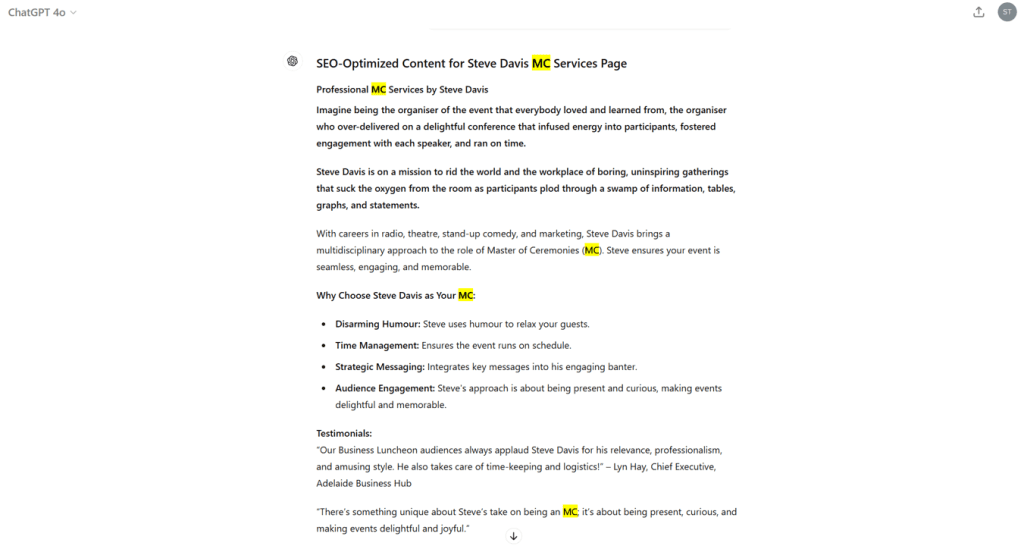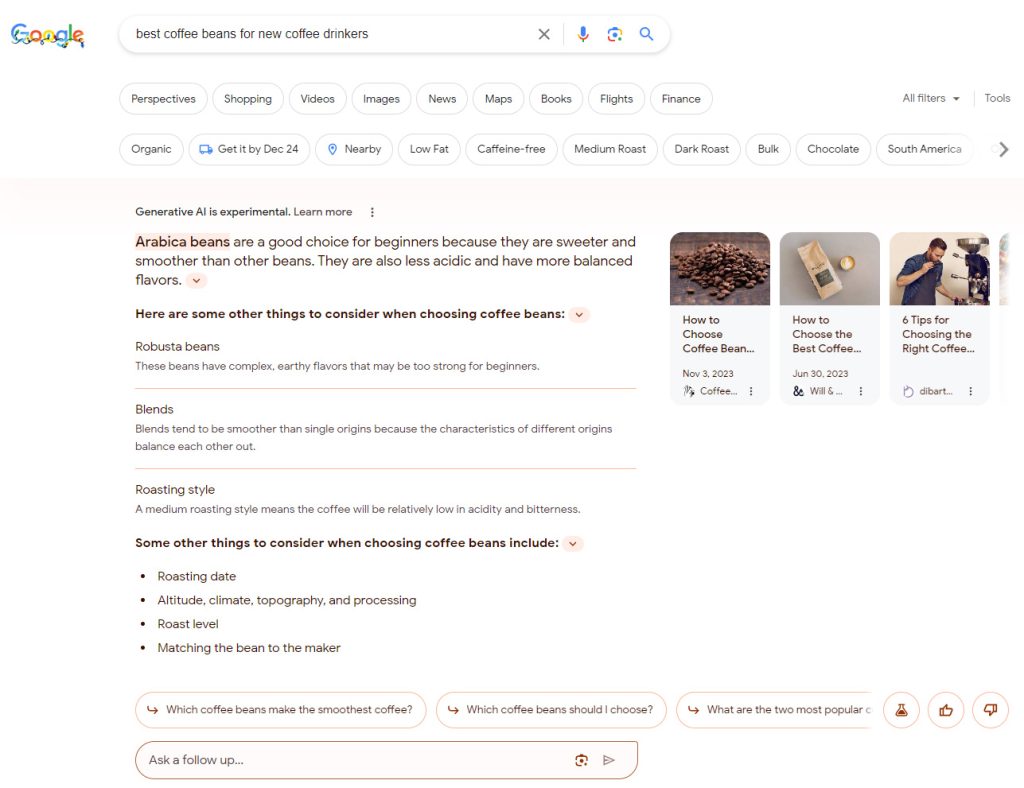For the past 20 years, I've watched the landscape of Search Engine Optimisation (SEO) evolve but with the advent of AI, that evolution has gotten faster and faster, bringing both challenges and opportunities for small business owners.
In this blog post, I will delve into how leveraging AI tools can enhance your SEO efforts, the importance of long-tail keywords inspired by customer personas, and how practical application of these principles can transform your online presence.
I'll also share insights from my experience optimising my MC services page through multiple iterations of copywriting with ChatGPT, demonstrating the importance of refining your AI-assisted content to truly speak to your audience.
Understanding AI-Powered SEO
AI tools can analyse vast amounts of data to identify patterns and optimise content for better search engine rankings.
These tools can suggest keywords, optimise on-page elements (the content your visitors see when they arrive at your site, as opposed to the code that happens behind the scenes), and even generate content.
However, the key is to use AI to amplify your expertise, not replace it.
While AI can produce content quickly, it often lacks the creativity and emotional connection that human writers bring. Thus, it's crucial to review and refine AI-generated content to ensure it aligns with your brand voice and engages your audience effectively.
My recommendation is to use AI for tasks like keyword research and technical SEO, but ensure that the core message and creativity come from your expertise. This balance will help you create high-quality, engaging content that resonates with your audience and performs well in search engines.
The Importance Of Your Expertise For Website Rankings
I mentioned expertise before, and there is a good reason for this.
In the AI-powered search landscape, Google's EEAT guidelines—Experience, Expertise, Authoritativeness, and Trustworthiness—play a crucial role in determining website rankings.
Expertise means your content should demonstrate a high level of knowledge in your field. This is particularly vital for YMYL (Your Money or Your Life) sites where accuracy can impact users' health, finances, or safety. This is what separates generic word soup produced by ChatGPT from actual insights based on your experience crafted wholly by you or with some support from ChatGPT.
Authoritativeness refers to the credibility of the content creator and the website hosting the content. Have received yet another creepy SEO company offering to spin up hundreds of junk websites for me to point links back to my site. Google sees through this "trick", and you should to. When you are crafting content on your own site, provided you have been writing for "people first", you should have good karma regarding credibility.
Trustworthiness involves the reliability and transparency of your content, including accurate sourcing and a secure site experience.
Experience: Those first three points relate to our content but this last one relates to the experience users have when they visit your site. To give them (and Google) a positive user experience, make sure your site has fast load times and presents well on any screen from mobile to desktop.
To meet these standards, focus on creating well-researched, accurate, and valuable content, using examples from your practice, that reflects your deep understanding of the subject. This not only boosts your search rankings but also establishes your brand as a trustworthy source of information.
SEO strategy with these guidelines, you enhance your site's relevance and reliability, ultimately improving its search engine rankings.
The Power of Long-Tail Keywords
Long-tail keywords are specific phrases that users are likely to search for. They are less competitive and often have higher conversion rates because they reflect detailed user intent.
For example, if I were a bakery in Adelaide, instead of targeting "cakes," I might use "best gluten-free cakes in Adelaide" to attract a more specific audience looking for gluten-free options. Of course, this assumes that IS my speciality and I have determined to go after these consumers.
The good news for those of us who can generate sets of very particular long-tail keyword sentences and questions (because we have meditated on and listened to our key personas) is that in the AI era, search engines are better at understanding context and intent of such phrases.
As a result, long-tail keywords can help you capture more specific searches and attract highly relevant traffic to your site.
Hopefully this explains why I go on and on about the importance of crafting customer personas. These characters we develop help us understand our audience's needs and preferences in an up close and personal way.
By producing content for these people, we can identify long-tail keywords that your ideal customers are likely to use.
Applying This Approach To My MC Services Page
Using AI and expert input (hmm, if that's what you call my input), I conducted an SEO audit for my MC services page, which I had previously thrown together at speed, knowing we are about to embark on a rewrite of the whole Talked About Marketing site.
Key findings included the need for optimised meta titles and descriptions, better use of keywords, and improved content structure. Ouch.
Here's what I received after asking ChatGPT to conduct an SEO audit of the page, by typing in its direct URL - https://talkedaboutmarketing.com/mc-services/.
1. Meta Title and Description:
- Current Meta Title: Missing
- Suggested Meta Title: "Professional MC Services in Adelaide | Steve Davis, Master of Ceremonies"
- Current Meta Description: Missing
- Suggested Meta Description: "Book Steve Davis for your next event. Professional MC services with humour, intelligence, and warmth. Adelaide-based, available Australia-wide."
2. Heading Structure:
- Current:
- H1: "MC Services"
- H2: "Book Steve Davis as your professional MC"
- Suggested:
- H1: "Professional MC Services by Steve Davis"
- H2: "Why Choose Steve Davis as Your MC"
- H2: "Client Testimonials"
- H2: "MC in Character"
- H2: "Contact Us to Book Steve Davis"
They were helpful. If you're not sure what Meta Title means, it is the title you can enter in your website, behind the scenes as you create your page, to offer search engines a succinct title. Ideally, this should match or be very close to the actual title. The meta description is a short sentence or two of no more than 160 characters that we can also add behind the scenes to "suggest" to Google what summary we would like searchers to see when our link appears on a search results page. If we don't specify anything (and, sometimes, even if we do), Google will grab what it thinks is the best snippet of text from our page for this purpose.
Perhaps the best insight it provided was in the list of subheadings for use throughout the piece. Despite me also being available to perform MC duties or do speeches in the character of Professor Sebastian Longsword, I hadn't really amplified that on the page. It's suggestion of "MC In Character" is simple, direct, and helpful for my audience personas.
With that noted, I turned to refreshing the writing on the page. I copied all the text from the initial page and gave ChatGPT the first of about five prompts as we iterated the page. I wrote:
Previously, you suggested that there were better keywords and headings to weave through the Steve Davis MC Services page. I will paste in the text and would appreciate suggestions, noting that I have two other snippets of text from people who have witnessed me as the Professor, which means I can create a section using your H2 suggestion, MC In Character (the professor also does team bonding and inspiration sessions, speeches, and workshops for clients, from Seeley International National Conferences to the Australia Marketing Institute's Networking Events, etc). Here is the current page text, excluding some testimonials sitting in their own sectio: Lift your event to the next level with bright, warm, and professional MC services from Steve Davis. [I then pasted in the existing text].
What I got was, as you might expect, flowery nothingness.
Lift your event to the next level with bright, warm, and professional MC services from Steve Davis. With careers involving radio, theatre, stand-up comedy, and marketing, Steve brings a multidisciplinary approach to the role of MC.
Ultimately, my prompts changed to lead with the most engaging elements but to actually focus on the overwhelming need and worries and dreams of my ideal audience persona; the person charged with the responsibility of selecting the MC and/or speakers. We ended up with this opening:
Imagine being the organiser of the event that everybody loved and learned from, the organiser who over-delivered on a delightful conference that infused energy into participants, fostered engagement with each speaker, and ran on time. Steve Davis is on a mission to rid the world and the workplace of boring, uninspiring gatherings that suck the oxygen from the room as participants plod through a swamp of information, tables, graphs, and statements.
That's all true and now we shall see if that does resonate with my people. There is still other material to add to the page, but this jumped from page 4 in Google to the bottom of page 1 in just a few days, for the search "Conference MC in Adelaide", which a prospect told me last week is what she used to search.

Structuring Your Website Using Pillar Content
To further optimise your website for SEO and user engagement, structuring it with pillar content is essential.
Pillar content acts as the foundational pages that cover broad topics in depth and link to more detailed, related content. This approach not only enhances user experience but also signals to search engines the importance and relevance of your primary topics.
To create pillar content you:
- Identify Key Topics: Choose 4-6 core topics that are central to your business and align with your customer personas.
- Develop Comprehensive Guides: Each pillar page should provide an in-depth overview of its topic, covering various subtopics and linking to detailed blog posts or articles.
- Link Strategically: Ensure all related content links back to these pillar pages, creating a cohesive structure that enhances navigation and SEO.
Here's an example for a bookkeeper targeting small businesses. Their pillar topics might include:
- Bookkeeping Basics for Small Businesses: Comprehensive guide covering fundamental bookkeeping practices, types of bookkeeping, and essential bookkeeping tasks.
- Tax Preparation and Filing: Detailed information on preparing and filing taxes, tax deadlines, and common tax deductions for small businesses.
- Payroll Management: In-depth look at payroll processes, payroll taxes, and managing employee records.
- Financial Reporting and Analysis: Guide on creating financial reports, interpreting financial data, and using financial analysis for business decisions.
- Accounting Software Solutions: Overview of popular accounting software, how to choose the right one, and tips for effective use.
Each pillar page would provide a comprehensive guide on the topic and link to more specific articles, such as "Top 10 Bookkeeping Tips for Small Businesses" under Bookkeeping Basics for Small Businesses.
The SEO guru, Neil Patel, has this helpful diagram on his page about pillar pages.

Summary of Best SEO Practices
There is much more to cover but hopefully the examples above will be helpful. For further reference, here is the list of items I covered in my DIY SEO workshop this week.
- Use Long-Tail Keywords:
- Target specific phrases that reflect your audience's detailed searches.
- Example: "Best gluten-free cakes in Adelaide" instead of just "cakes."
- Application: Reflect on your Personas, draw from actual questions you get asked and use ChatGPT to help find relevant long-tail keywords and integrate them naturally into your content. It’s akin to fine-tuning an old-fashioned radio to the exact station your customers are listening to.
- Create High-Quality Content:
- Focus on valuable, engaging content addressing your audience's needs.
- Example: Blog posts that answer common customer questions or solve specific issues.
- Application: Write in-depth articles that provide comprehensive solutions and insights, ensuring your content is informative and useful.
- Optimise Meta Titles and Descriptions:
- Ensure each page has a unique, keyword-rich title and meta description.
- Example: "Affordable SEO Services for Small Businesses | Talked About Marketing."
- Application: Use AI tools like ChatGPT to draft meta descriptions, then refine them to include your target keywords and a clear call to action.
- Ensure Mobile-Friendliness:
- Your website should be responsive and load quickly on mobile devices.
- Application: Test your site using Google’s Mobile-Friendly Test and PageSpeed Insights, then make necessary adjustments like optimising images and using a responsive design.
- Improve Site Speed:
- Fast-loading pages enhance user experience and SEO rankings.
- Application: Use a Content Delivery Network (CDN) like Cloudflare and compress images to improve load times. Regularly monitor site speed and address any performance issues.
- Leverage Internal Linking:
- Link to your pillar content to enhance site structure and SEO.
- Example: Link from a blog post on "SEO Basics" to a main "Comprehensive SEO Guide" page.
- Application: Create a content map to identify pillar pages and ensure all relevant content links back to these central hubs.
- Use Schema Markup:
- Implement schema to help search engines understand your content.
- Example: Add LocalBusiness schema for contact information.
- Application: Use tools like Google’s Structured Data Markup Helper to add schema markup to your site, enhancing search visibility and providing richer search results.
- Monitor and Adjust:
- Regularly review performance metrics and adjust your strategy accordingly.
- Application: Set up Google Analytics and Google Search Console to track visitor behaviour and site performance. Use this data to refine your content and SEO strategies.
SEO in the AI era is about thoughtfully using AI tools to enhance your expertise and focusing on the needs of your ideal customer personas.
By using long-tail keywords and following best practices, small business owners can improve their search engine visibility and attract more relevant traffic. Embrace these strategies, and you'll be well on your way to mastering SEO in the AI era, especially as Google rolls out its AI assisted search results - it will draw these items from sites with the best, typically long-tail content, and hopefully that will be you!


